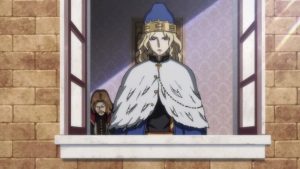 The movement of the chess pieces continues on Shoukoku no Altair this week, a mad rush to occupy squares on the board before the opponent gets there first. For the early portions of the game Mahmut has been fully in damage control mode, strictly playing defense. But his deft handling of the Sultanates’ rebellion has turned the tables, and now he’s fighting the Empire on basically equal footing. As you’d expect, it’s only here that he’s able to display all of the abilities that before were mostly just potential.
The movement of the chess pieces continues on Shoukoku no Altair this week, a mad rush to occupy squares on the board before the opponent gets there first. For the early portions of the game Mahmut has been fully in damage control mode, strictly playing defense. But his deft handling of the Sultanates’ rebellion has turned the tables, and now he’s fighting the Empire on basically equal footing. As you’d expect, it’s only here that he’s able to display all of the abilities that before were mostly just potential.
 The skirmish of the week is Urado, a frigid northern kingdom that’s been mostly closed off for 400 years and has tougher immigration policies than the NGL (and as cold as it is there, I sure hope the border guards have gloves). As best I can tell Urado is probably based on Wallachia, which is now part of Romania but in the 15th Century became part of the Ottoman Suzerainty. It also bounced between the Turks and the Holy Roman Empire a couple of times, and has long held a position of no little strategic importance in Eastern Europe.
The skirmish of the week is Urado, a frigid northern kingdom that’s been mostly closed off for 400 years and has tougher immigration policies than the NGL (and as cold as it is there, I sure hope the border guards have gloves). As best I can tell Urado is probably based on Wallachia, which is now part of Romania but in the 15th Century became part of the Ottoman Suzerainty. It also bounced between the Turks and the Holy Roman Empire a couple of times, and has long held a position of no little strategic importance in Eastern Europe.
 You know the drill here – a race against time trying to beat Balt-Rhein to the punch and bring territory under sway. But Shoukoku no Altair is not to be faulted for being repetitive, because that’s pretty much how continental wars have been fought in Europe for the past thousand years. After a grueling border exam, Team Mahmut is allowed into Urado upon the arrival of Margit (Han Megumi). She introduces herself as the ambassador to Turkiye but she’s considerably more than that – she’s also a Kulak, and a princess to boot, which we discover on the arrival of her father, King Sigmund (Hayami Show).
You know the drill here – a race against time trying to beat Balt-Rhein to the punch and bring territory under sway. But Shoukoku no Altair is not to be faulted for being repetitive, because that’s pretty much how continental wars have been fought in Europe for the past thousand years. After a grueling border exam, Team Mahmut is allowed into Urado upon the arrival of Margit (Han Megumi). She introduces herself as the ambassador to Turkiye but she’s considerably more than that – she’s also a Kulak, and a princess to boot, which we discover on the arrival of her father, King Sigmund (Hayami Show).
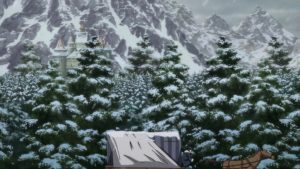 Sigmund is sympathetic towards Mahmut, a fellow falconer, but Mahmut’s spider senses pick up on the fact that something is amiss. He has in fact been beaten to the punch by Balt-Rhein, who’ve sent their envoy to negotiate a deal to help feed the country’s starving peasants in exchange for free passage through its territory (and access to its natural resources, no doubt). This has been helped along by the King’s other daughter, Gertrude (Kimura Juri), who happens to be the ambassador to Balt-Rhein. The argument here is pretty straightforward – Balt-Rhein is the biggest shark in the water, and you don’t want to get on their bad side.
Sigmund is sympathetic towards Mahmut, a fellow falconer, but Mahmut’s spider senses pick up on the fact that something is amiss. He has in fact been beaten to the punch by Balt-Rhein, who’ve sent their envoy to negotiate a deal to help feed the country’s starving peasants in exchange for free passage through its territory (and access to its natural resources, no doubt). This has been helped along by the King’s other daughter, Gertrude (Kimura Juri), who happens to be the ambassador to Balt-Rhein. The argument here is pretty straightforward – Balt-Rhein is the biggest shark in the water, and you don’t want to get on their bad side.
 It seems as if Mahmut and his followers are headed for execution, but Abriga’s sharp senses have identified the stink coming from the cliffs near the village as sterco (which I assume is a bastardization of guano), the fossilized droppings of seabirds – which (this is true) happen to make tremendous fertilizer and are worth a lot of money. That boils this down to Turkiye’s economic appeal vs. Balt-Rhein’s military one – and Mahmut shrewdly plays on the rather harsh treatment of Phoinike once it became a part of the Empire. Of such decisions are kingdoms and wars won and lost, and here I think Balt-Rhein falls victim to their own success a bit – as conquerers they have a track record now, and it’s not one most smaller nations would like to become a part of. As successes go, this is a pretty big one for Mahmut – but Balt-Rhein is likely about to take on the behavior of a cornered rat…
It seems as if Mahmut and his followers are headed for execution, but Abriga’s sharp senses have identified the stink coming from the cliffs near the village as sterco (which I assume is a bastardization of guano), the fossilized droppings of seabirds – which (this is true) happen to make tremendous fertilizer and are worth a lot of money. That boils this down to Turkiye’s economic appeal vs. Balt-Rhein’s military one – and Mahmut shrewdly plays on the rather harsh treatment of Phoinike once it became a part of the Empire. Of such decisions are kingdoms and wars won and lost, and here I think Balt-Rhein falls victim to their own success a bit – as conquerers they have a track record now, and it’s not one most smaller nations would like to become a part of. As successes go, this is a pretty big one for Mahmut – but Balt-Rhein is likely about to take on the behavior of a cornered rat…


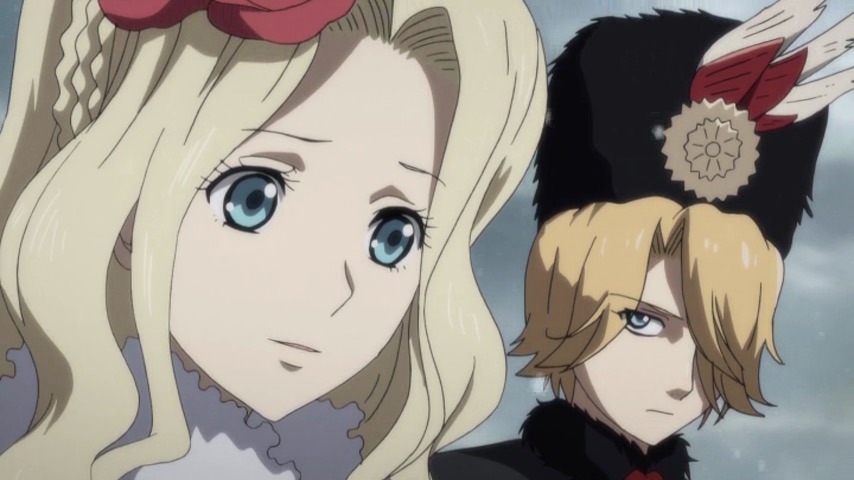

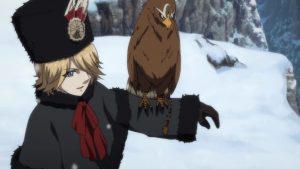
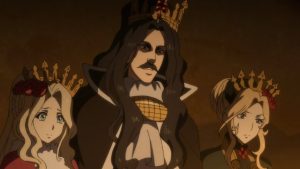






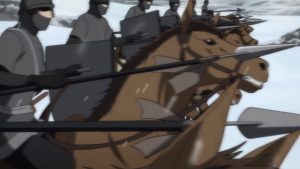
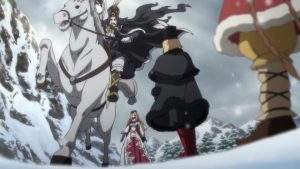


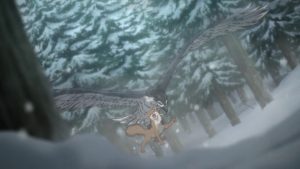




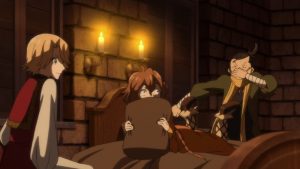
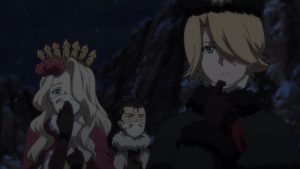


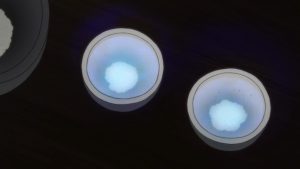


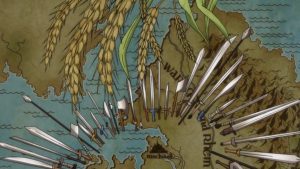


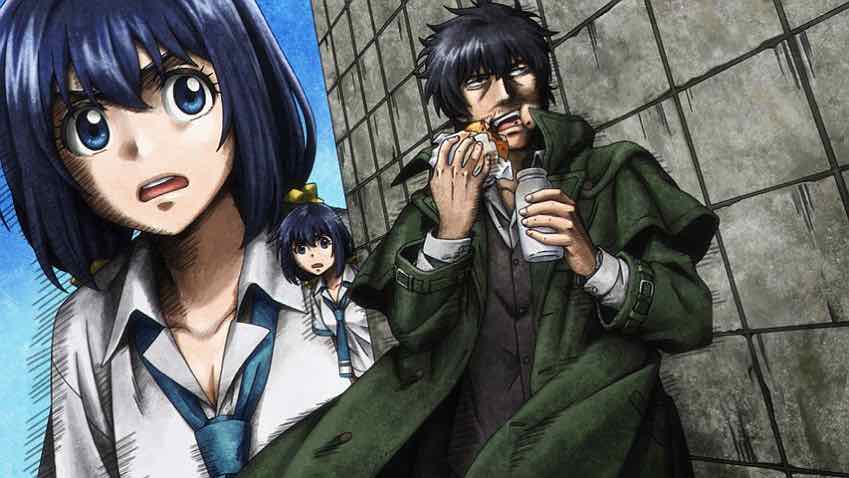
Lark
October 21, 2017 at 3:07 amHan Megumi is very good at voicing boys, but somehow it’s her female roles I find especial joy in listening to (funnily enough, the opposite applies to Komatsu Mikako- was it her voicing young Kemal back in episode 13?).
I don’t think Mahmut’s adventures in Urado end here- Sigmund and Margit feature quite prominently in next episode’s preview.
Ronbb
October 21, 2017 at 11:51 pmThe storytelling of this show is pretty straight forward, but we’re really starting to see the real deal…am anticipating that both politics and war tactics come into play as the story progresses.
Kurik
October 22, 2017 at 12:53 amwelll i must say this show is teaching me about economic politics and how the simpliest of things can change the course of a country. First packaging and now fertilzer. What next?! Loving it so far.
Guardian Enzo
October 22, 2017 at 9:07 amRead up on “Guns and Butter”, and also the role salt has played in the development if civilisation. Fascinating stuff.